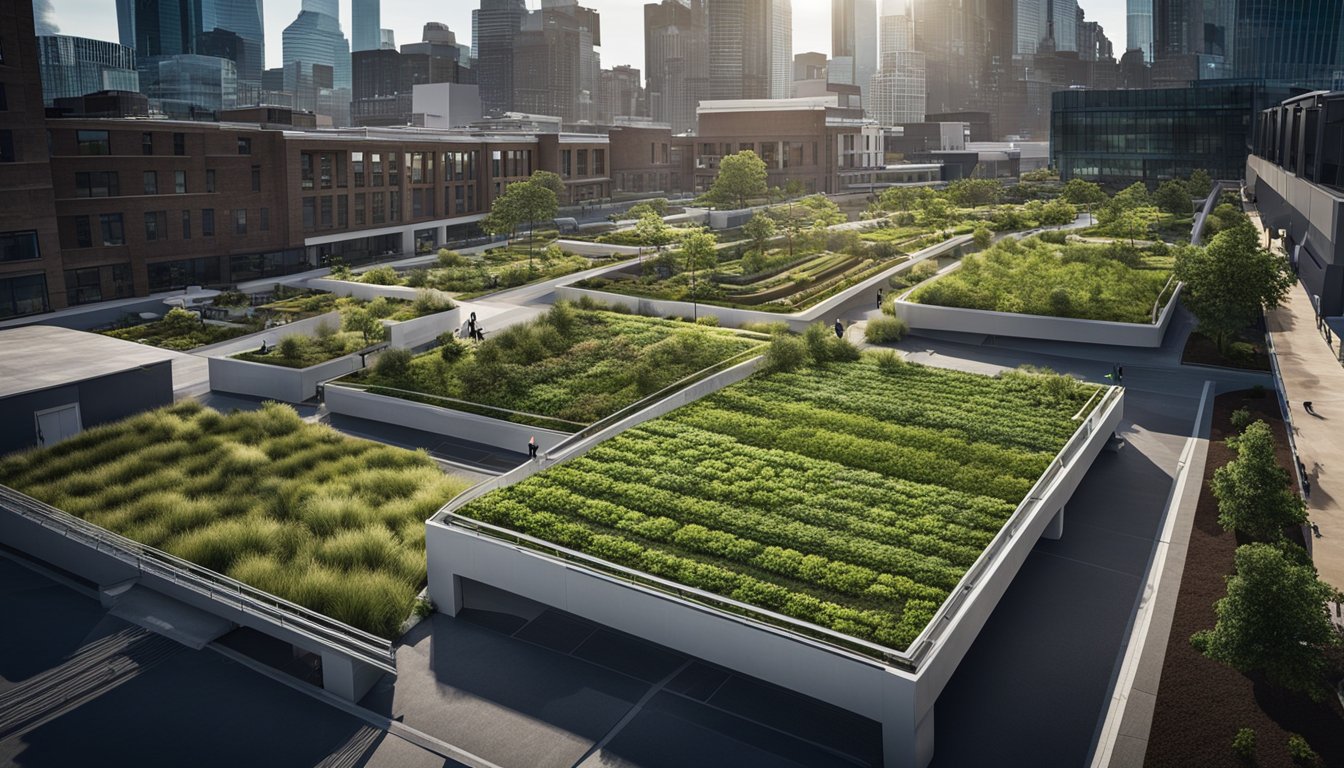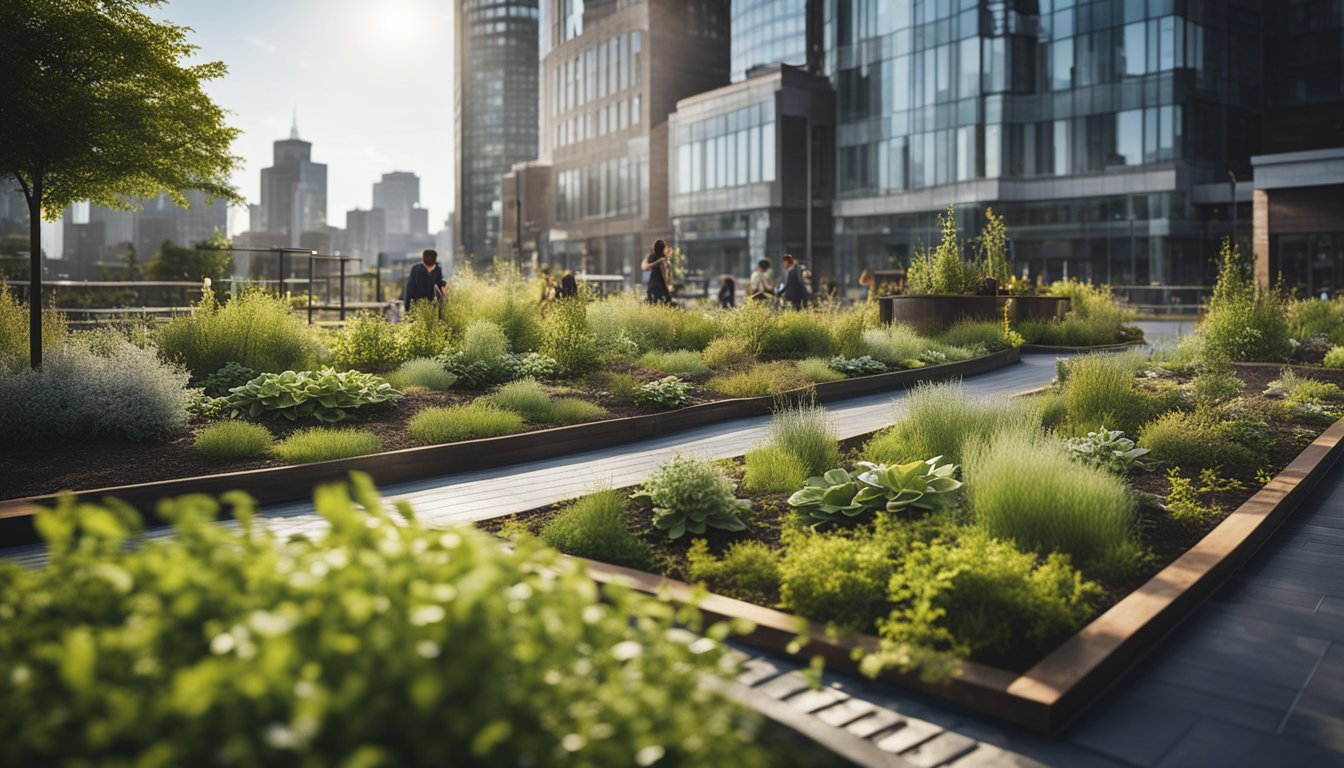Late updated: 18 Feb 2025 09:02
Written by: Sarah Hollister
Eco-Friendly Water Management for Urban Areas: Strategies and Benefits
As urbanisation accelerates and cities expand, the demand for effective water management has never been more critical. Eco-friendly water management strategies are essential in ensuring that urban areas remain sustainable and resilient amidst growing populations and the impacts of climate change. Our cities face numerous challenges, including water scarcity, pollution, and outdated infrastructure. By implementing innovative solutions like smart water systems and rainwater harvesting, we can address these issues effectively.

Eco-friendly water management in urban areas involves a delicate balance between innovation and practicality. It's not just about conserving water but about rethinking how we use and manage this precious resource. From designing aesthetically pleasing yet practical water features to revitalising existing water systems, our cities can lead the way in sustainable urban development. Sustainable urban design needs to integrate smart solutions that prioritise efficiency and resilience, especially as we grapple with climate change.
The journey towards eco-friendly urban water management is filled with challenges, yet offers immense opportunities. Cities that adopt sustainable practices will protect natural resources and enhance the quality of life for their inhabitants. As we explore these innovative approaches, we will discover new ways to foster resilience and ensure that our urban environments thrive in harmony with nature.
Key Takeaways
- Eco-friendly strategies are pivotal for sustainable urban water management.
- Innovative solutions help address urban water scarcity and pollution.
- Sustainable practices enhance urban resilience and quality of life.
Urban Water Management Strategies
In urban environments, sustainable water management is essential to balance water consumption with the environmental impact and public health requirements. Strategies such as conservation measures, innovative harvesting techniques, and green infrastructure design are central to achieving this balance.
Water Conservation Measures
Water conservation is pivotal for urban areas facing supply and demand challenges. Efficient water management can be implemented through water-efficient appliances and drip irrigation systems that minimise water wastage.
Adopting greywater recycling systems is another effective measure. These systems allow for the reuse of water from sinks and showers for irrigation purposes. Educating the community about water conservation techniques, such as xeriscaping with native and drought-resistant plants, supports these efforts. By integrating these systems, urban areas can maintain water quality and ensure sustainable urban development.
Innovative Water Harvesting Techniques
Innovative water harvesting techniques enhance urban water strategies significantly. Rainwater harvesting systems collect rainwater from rooftops, redirecting it into storage tanks or rain barrels for later use. This reduces reliance on traditional water supplies.
Stormwater management is another critical area where bioswales and water-sensitive urban design (WSUD) are utilised. These elements capture stormwater for reuse, reducing urban flooding and supporting biodiversity. With the implementation of these systems, cities can foster climate resilience and develop a sustainable water supply.
Green Infrastructure and Design
Green infrastructure integrates environmental sustainability with urban planning. Technologies like green roofs and rain gardens are implemented to manage water runoff. These serve as natural systems to filter stormwater while creating added green spaces.
Incorporating smart water management technologies supports efficient irrigation systems and optimises water use in urban areas. This type of design not only improves water recycling but also promotes biodiversity by supporting various plant species. Through strategic urban design, we can enhance environmental impact and ensure sustainable urban development.
Challenges and Solutions in Urban Water Dynamics

Urbanisation presents significant difficulties for sustainable water management. These challenges are compounded by climate change and increased water demand. Integrated water management and innovative solutions are essential to address the scarcity of resources and improve water use efficiency. Ecosystem-friendly practices and public engagement play a crucial role in creating sustainable urban environments.
Addressing Water Scarcity and Climate Effects
Urban areas often face water scarcity due to factors like population growth and climate change. This scarcity is exacerbated by the urban heat island effect, which increases water demand. To combat this, cities can implement low-flow fixtures and encourage the use of non-potable water for activities such as irrigation. Modular systems for rainwater harvesting can also help mitigate droughts and support municipal supplies during water shortages.
In addition to technological solutions, integrated water management strategies can optimise resource use. These strategies emphasise a holistic view of urban water systems, coordinating stormwater, wastewater, and potable water supplies. By addressing the infrastructure needs and accounting for future growth, cities can ensure sustainable living and enhance their resilience against climate-induced challenges.
Water Recycling and Reuse Initiatives
Promoting water recycling is critical in urban environments. By treating greywater for non-potable uses, cities can reduce their reliance on freshwater resources. This includes implementing systems for greywater recycling within residential and commercial buildings. These practices contribute to cost savings and minimise water pollution.
Eco-friendly practices such as reusing treated wastewater also present viable paths for water conservation. Cities can explore using recycled water in industrial processes or for air purification systems. Such initiatives not only manage the urban water demand but also support the creation of sustainable urban environments. By fostering community adoption of these systems, we can enhance the efficiency of water use across various sectors.
Public Engagement and Policy Frameworks
Effective management of urban water dynamics requires public education and strong policy frameworks. Community engagement initiatives play a pivotal role in promoting awareness about conservation and sustainable practices. Public awareness campaigns can highlight the importance of water-saving strategies and encourage residents to adopt best practices.
Environmental policies must support the transition to sustainable water management by incentivising eco-friendly technologies and improving urban planning. Collaborative efforts between government agencies, businesses, and citizens are essential to create a supportive environment for long-term water sustainability. As stakeholders become more knowledgeable and active participants, the success in implementing water management solutions will be significantly escalated.
Frequently Asked Questions

Our focus is to address how green infrastructure can significantly improve urban water management, the benefits it provides, effective nature-based solutions, successful projects, sustainable water practices, and the implementation of urban water management plans.
How can green infrastructure contribute to stormwater management in cities?
Green infrastructure plays a crucial role in managing stormwater by using natural processes to slow down and absorb rainfall. This helps to reduce the strain on traditional drainage systems, lowering the risk of flooding and improving water quality by filtering pollutants.
What benefits does green infrastructure provide to the urban environment?
Green infrastructure improves air quality, enhances biodiversity, and provides recreational spaces for communities. It also helps to decrease the urban heat island effect by increasing green spaces, which leads to cooler city environments.
What are the most effective nature-based solutions for water management in metropolitan areas?
Rain gardens, green roofs, and permeable pavements are some of the most effective nature-based solutions. These methods allow rainwater to infiltrate the ground, reduce runoff, and support water conservation efforts while integrating seamlessly into urban landscapes.
Can you describe some successful examples of eco-friendly water management projects in urban settings?
Examples include New York City's Green Infrastructure Program, which reduces stormwater runoff using rain gardens and bioswales. Similarly, Copenhagen's cloudburst plans incorporate green streets and retention areas, showcasing innovative approaches to urban water challenges.
What are sustainable practices for managing water resources within urban landscapes?
Practices such as rainwater harvesting, greywater recycling, and implementing water-efficient appliances are key strategies. These reduce water consumption and reliance on external water sources, supporting a sustainable urban water management approach.
How is the Urban Water Management Plan implemented to address water issues in cities?
Urban Water Management Plans involve assessing current water resources, identifying potential challenges, and outlining strategies to address these issues. They include stakeholder engagement, policy development, and monitoring to ensure effective implementation and adaptation to changing conditions.
